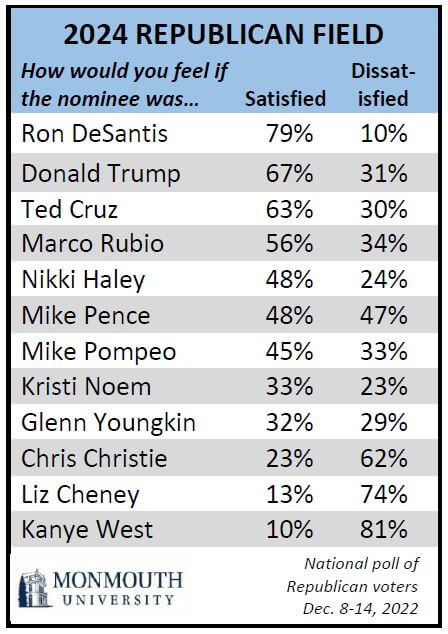West Long Branch, NJ – Small government, America First, liberty and freedom, religious values, personal responsibility. These are just some of the ways Republican voters describe what it means to be a good Republican in the latest Monmouth (“Mon-muth”) University Poll. While few voters specifically mention abortion when asked to describe the Republican ideal, it is one of the top issues that GOP voters point to as a dividing line on whether one can be called a good Republican. Interestingly, one third of Republican voters maintain that you have to deny the legitimacy of President Joe Biden’s election in order to be considered a good Republican. The poll also asks about preferences for the GOP presidential nominee in 2024. Florida Gov. Ron DeSantis and former President Donald Trump lead the field, although few would support an independent candidacy by Trump if he did not get the party’s nod.
The poll first asked Republican voters to describe in their own words what it means to be a good Republican. About 1 in 5 focus on fiscal management, such as being fiscally conservative (6%), supporting small government (8%), lowering taxes (3%), and helping the middle and working class (4%). Nearly a quarter of GOP voters emphasize patriotism and rights, including defending the Constitution (8%), putting America first (7%), protecting individual liberties (7%), and upholding the 2nd Amendment in particular (2%). About a quarter think of personal responsibility when asked what it means to be a good Republican, including doing one’s civic duty as a citizen (7%), being honest (6%), taking a stand on issues (5%), being self-reliant (5%), and just generally being a good person (3%). Other voter descriptions of being a good Republican focus on religion, moral values and abortion (13%).
“There is no prevailing view of what it means to be a good Republican. Some voters focus on fiscal conservatism and others on social issues, while a sizable group see flag-waving as being most important. It’s interesting that only 1 in 10 voters mention something about religion or family values and only a handful specifically mention being pro-life as the hallmark of a good Republican. When you ask these voters directly, however, supporting abortion access is the biggest deal-breaker for being considered a good Republican,” said Patrick Murray, director of the independent Monmouth University Polling Institute.
Less than 4 in 10 (38%) Republican voters say someone who supports legalized abortion can be a considered a good Republican. Nearly half (46%) say someone who holds this position cannot be a good Republican and 16% are unsure. At the other end of the spectrum, a slight majority (54%) say someone who supports same sex marriage can be considered a good Republican (34% say they cannot), and a similar number (52%) say a good Republican can support expanding Medicare access (29% say they cannot). Opinion is more divided on whether good Republicans can support some tax increases (49% can versus 37% cannot) or support immigration reforms that allow some illegal immigrants to remain in the country (45% can versus 39% cannot).

In general, self-described moderates are more likely than very conservative Republicans to say you can hold any of these positions and still be considered a good party member. There also tend to be significant age differences, with Republicans under 50 years old being much more tolerant of holding these positions, with the exception of supporting tax increases where there is no difference in opinion by age. There are some significant regional differences on social issues, with Northeast and West Coast Republicans being more accepting of support for legal abortion and same sex marriage within the party than are Republicans who live in the rest of the country. There are few gender differences on any of these issues, including abortion.
A majority (55%) of Republican voters continue to say that Biden’s 2020 victory was due only to voter fraud. Just 28% say the current president won fair and square. While Republican belief in election fraud has been fairly consistent over the past two years, a majority (55%) say that someone who accepts Biden as being legitimately elected can still be considered a good Republican. However, just over 1 in 3 (35%) say Republicans who acknowledge this cannot call themselves good Republicans. Among those who personally believe Biden only won due to voter fraud, 40% are okay with other Republicans acknowledging the election as legitimate (51% are not). Overall, college graduates (68%) are among the Republicans most likely to tolerate this opinion, but they themselves are still more likely to view the 2020 outcome as the product of fraud (49%) rather than being fair and square (38%).
“It may be a minority view within the party, but it’s important to underscore this point. One third of Republican voters basically say you have to hold a position that undermines public faith in America’s electoral process in order to be considered a good Republican,” said Murray.
Republican voters were asked if they have a preference for their party’s presidential nominee in 2024. Not surprisingly the two names mentioned are those the media are talking about most often –DeSantis (39%) and Trump (26%). When asked specifically how they would feel about either man being the nominee, 79% said they would be satisfied with DeSantis and 67% would be satisfied with Trump. There are not a lot of demographic differences in satisfaction with either candidate, except that college graduates (45%) and moderate Republicans (47%) are more likely to be dissatisfied if Trump is the party’s nominee again.
Just 22% of Republican voters think Trump should run as an independent in 2024 if he does not win the Republican nomination. Seven years ago, when he was leading the pack right before the 2016 primaries got underway, 34% of Republican voters said he should run as an independent if he didn’t get the nomination that year.
“When Trump first ran, there was a little more support for him shaking up the Republican Party. Now that the GOP’s image has really been molded by Trump, it makes less sense for him to be seen as a disrupter,” said Murray.
Among ten other possible contenders asked about in the poll, a majority of GOP voters would be satisfied with Texas Sen. Ted Cruz (63%) or Florida Sen. Marco Rubio (56%). Just under half say the same about former UN. Ambassador and South Carolina governor Nikki Haley (48%) and former Secretary of State Mike Pompeo (45%).

Party opinion is divided on former Vice President Mike Pence – 48% would be satisfied with him as the nominee and 47% would be dissatisfied. Opinion is also somewhat divided on South Dakota Gov. Kristi Noem (33% satisfied and 23% dissatisfied) and Virginia Gov. Glenn Youngkin (32% satisfied and 29% dissatisfied), although they are less widely known than others in the potential field. Three of the possible contenders mentioned in the poll registered majority dissatisfaction if any of them became the nominee, but only one of those is a realistic candidate possibility – former New Jersey Gov. Chris Christie (23% satisfied and 62% dissatisfied). Others that register clear dissatisfaction as possible GOP nominees are outgoing Wyoming Congresswoman Liz Cheney (13% satisfied and 74% dissatisfied) and 2020 independent candidate (on 12 state ballots) Kanye West (10% satisfied and 81% dissatisfied).
The Monmouth University Poll was conducted by telephone from December 8 to 14, 2022 with 563 Republican and Republican leaning voters in the United States. The question results in this release have a margin of error of +/- 5.2 percentage points for the full sample. The poll was conducted by the Monmouth University Polling Institute in West Long Branch, NJ.
QUESTIONS AND RESULTS
(* Some columns may not add to 100% due to rounding.)
[Q1-18 previously released.]
19.What does being a good Republican mean to you? [LIST WAS NOT READ] [Note: Results add to more than 100% because multiple responses were accepted.]
| Dec. 2022 | |
| Fiscally conservative | 6% |
| Conservative – nonspecific | 3% |
| Small\limited government | 8% |
| Lower taxes | 3% |
| Help working\middle class | 4% |
| Listen to all people, serve all | 6% |
| Being willing to compromise, not dogmatic | 3% |
| Constitution – protect\stand up for | 8% |
| Freedom, liberty, individual rights | 7% |
| America First, flag, patriotism | 7% |
| Do the right thing, take a stand | 5% |
| Responsibility, civic duty, law abiding | 7% |
| Honest, truthful | 6% |
| Good person | 3% |
| Self-reliant | 5% |
| Guns | 2% |
| Protect border, immigration | 2% |
| Vote party, against Dems | 8% |
| Values – nonspecific | 3% |
| Morality, Family values, God | 8% |
| Pro-life, anti-abortion | 2% |
| Other | 10% |
| (VOL) Don’t know | 13% |
| (n) | (563) |
20.Do you believe Joe Biden won the 2020 election fair and square, or do you believe that he only won it due to voter fraud?
| TREND: | Dec. 2022 | Sept. 2022 | Aug. 2022 | June 2022 | Jan. 2022 | Nov. 2021 | June 2021 | March 2021 | Jan. 2021 | Nov. 2020 |
| Fair and square | 28% | 32% | 27% | 28% | 32% | 27% | 29% | 25% | 26% | 18% |
| Due to voter fraud | 55% | 55% | 61% | 58% | 58% | 66% | 63% | 66% | 69% | 69% |
| (VOL) Don’t know | 17% | 13% | 12% | 14% | 10% | 7% | 8% | 9% | 5% | 13%* |
| (n) | (563) | (348) | (318) | (392) | (390) | (320) | (319) | (315) | (280) | (325) |
* Includes 4% who said Biden would not be declared the winner.
[QUESTIONS 21–25 WERE ROTATED]
21.Can someone who supports same sex marriage be considered a good Republican, or not?
| Dec. 2022 | |
| Can | 54% |
| Cannot | 34% |
| (VOL) Don’t know | 12% |
| (n) | (563) |
22.Can someone who supports legalized abortion be considered a good Republican, or not?
| Dec. 2022 | |
| Can | 38% |
| Cannot | 46% |
| (VOL) Don’t know | 16% |
| (n) | (563) |
23.Can someone who supports expanding Medicaid access be considered a good Republican, or not?
| Dec. 2022 | |
| Can | 52% |
| Cannot | 29% |
| (VOL) Don’t know | 19% |
| (n) | (563) |
24.Can someone who supports some tax increases be considered a good Republican, or not?
| Dec. 2022 | |
| Can | 49% |
| Cannot | 37% |
| (VOL) Don’t know | 14% |
| (n) | (563) |
25.Can someone who supports immigration reform that allows some illegal immigrants already here to stay in the country be considered a good Republican, or not?
| Dec. 2022 | |
| Can | 45% |
| Cannot | 39% |
| (VOL) Don’t know | 16% |
| (n) | (563) |
26.Can someone who accepts Joe Biden as the legitimately elected president be considered a good Republican, or not?
| Dec. 2022 | |
| Can | 55% |
| Cannot | 35% |
| (VOL) Don’t know | 9% |
| (n) | (563) |
27.Looking ahead, who would you like to see as the Republican nominee for President in 2024? [LIST WAS NOT READ]
| Dec. 2022 | |
| Ron DeSantis | 39% |
| Donald Trump | 26% |
| Mike Pence | 2% |
| Nikki Haley | 1% |
| Ted Cruz | 1% |
| Others | 6% |
| (VOL) Don’t know | 25% |
| (n) | (563) |
28.I am going to read the names of some Republicans who may run for president in 2024. For each one, please tell me whether you would feel very satisfied, somewhat satisfied, somewhat dissatisfied, or very dissatisfied if they became the Republican nominee. [NAMES WERE ROTATED]
| Very satisfied | Somewhat satisfied | Somewhat dissatisfied | Very dissatisfied | (VOL) Don’t know | (n) | |
| Donald Trump | 40% | 27% | 16% | 15% | 1% | (563) |
| Ron DeSantis | 59% | 20% | 7% | 3% | 10% | (563) |
| Mike Pence | 11% | 37% | 22% | 25% | 5% | (563) |
| Mike Pompeo | 9% | 36% | 21% | 12% | 22% | (563) |
| Nikki Haley | 17% | 31% | 15% | 9% | 27% | (563) |
| Ted Cruz | 23% | 40% | 18% | 12% | 6% | (563) |
| Marco Rubio | 12% | 44% | 25% | 9% | 10% | (563) |
| Glenn Youngkin | 7% | 25% | 16% | 13% | 40% | (563) |
| Chris Christie | 3% | 20% | 27% | 35% | 15% | (563) |
| Kristi Noem | 10% | 23% | 14% | 9% | 44% | (563) |
| Liz Cheney | 3% | 10% | 14% | 60% | 13% | (563) |
| Kanye West | 2% | 8% | 13% | 68% | 10% | (563) |
29.If Donald Trump does not win the Republican nomination for president, do you think he should run as an independent, or not?
| COMPARISON: | Dec. 2022 | Dec. 2015 |
| Yes | 22% | 34% |
| No | 72% | 61% |
| (VOL) Depends | 2% | 2% |
| (VOL) Don’t know | 4% | 2% |
| (n) | (563) | (385) |
METHODOLOGY
The Monmouth University Poll was sponsored and conducted by the Monmouth University Polling Institute from December 8 to 14, 2022 with a probability-based national random sample of 563 registered voters who identify with or lean toward the Republican Party. This includes 196 contacted by a live interviewer on a landline telephone and 367 contacted by a live interviewer on a cell phone, in English. Telephone numbers were selected through a mix of random digit dialing and list-based sampling. Landline respondents were selected with a modified Troldahl-Carter youngest adult household screen. Interviewing services were provided by Braun Research, with sample obtained from Dynata (RDD, n=235), Aristotle (list, n=303) and a panel of prior Monmouth poll participants (n=25). Monmouth is responsible for all aspects of the survey design, data weighting and analysis. The full sample is weighted for region, age, education, gender and race based on voter list and US Census information (ACS 2018 one-year survey). For results based on this sample, one can say with 95% confidence that the error attributable to sampling has a maximum margin of plus or minus 5.2 percentage points (adjusted for sample design effects). Sampling error can be larger for sub-groups (see table below). In addition to sampling error, one should bear in mind that question wording and practical difficulties in conducting surveys can introduce error or bias into the findings of opinion polls.
DEMOGRAPHICS (weighted) |
| Self-Reported |
| 48% Strong Republican |
| 21% Republican, not strong |
| 31% Independent, lean Rep. |
| 53% Male |
| 47% Female |
| 16% 18-34 |
| 23% 35-49 |
| 32% 50-64 |
| 29% 65+ |
| 78% White |
| 13% Hispanic |
| 9% Black/Asian/Other |
| 40% High school or less |
| 32% Some college |
| 28% 4 year degree |
Click on pdf file link below for full methodology and crosstabs by key demographic groups.




